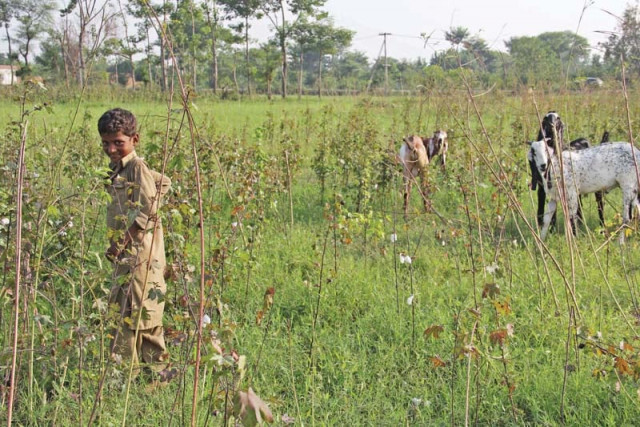Relief now has a different meaning for farmers
Sector keenly awaits PM’s word amid falling commodity prices .

Sector keenly awaits PM’s word amid falling commodity prices. PHOTO: AYESHA MIR/EXPRESS
While it is too early to paint a complete picture of what is happening in Pakistan’s agricultural sector, one thing is for sure: the government of Prime Minister Nawaz Sharif would have to come to the rescue of farmers who are feeling the heat of falling commodity prices.
On its part, Islamabad has come up with a relief package, expected to be announced this week. Details have been kept under a tight wrap and no one seems to be sure which crops will be the main beneficiaries.
Punjab Finance Minister Ayesha Ghaus Pasha says that a “significant” package has been worked out, but insisted it was primarily for small farmers who own land measuring up to 12.5 acres.
Read: Returns on produce: Farmers protest for support prices raise
“There is genuineness in the claim that farmers have had difficulty in laying-off stocks. We are also seeing a deflationary trend. But that could be countered with timely intervention,” she said.
She didn’t share details of the package, but stated that it was a nationwide programme and only the premier would announce it.
But such words will not be of any comfort for Hamid Malhi, a farmer from Narowal, who says even someone with a thousand acres has equally been affected.
“This is an unprecedented situation for us. No one was expecting this to happen and persist for this long,” he says, pointing out that government intervention had become imperative not just for large crops but vegetables too.
The history
Pakistan’s rural economy has seen a boom in the past few years. It started sometime in the mid-2000s, with a rise in demand for commodities the world over, cash changed hands like never before.
“Things were on our side. Oil price was up but so was the ethanol demand (which comes from sugarcane), there were sanctions on Iran but it bought grains from us to build up its stocks,” said Malhi.
Times and circumstances changed swiftly in the past two years. And the most pronounced affects could be seen in matter of rice, which is the largest commodity the country exports.
Malhi said rice traders and millers have been left holding stocks of a million tons, worth Rs100 billion. “Farmers are even more anxious as to what would happen if they go bankrupt and no one comes to help lift the crop from them.”
A delegation of farmers met Federal Minister for Planning and Development Ahsan Iqbal a couple of days ago and presented its demand, which included a proposal to subsidise rice export by at least $200 a ton.
But it is unlikely that a government, which has imposed unpopular taxes in recent months to shore up national reserves, would agree.
Or should it be left to the market forces?
“Maybe so,” says a leading member of Rice Exporters Association of Pakistan (REAP). “Commodity price did not come down overnight. It was the greed of the trader who waited month after month instead of booking the loss.”
Read: Food production is not the problem
Yet, beyond the debate of subsidies and relief, the government must look at the cost-related issues with agriculture. “Hasn’t anyone noticed the kind of money fertiliser makers have been making on subsidised natural gas?”
While stocks of wheat has also been rising, the private sector has not yet felt the heat as most of the excess goes to government go-downs. However, concerns are now being shared about next season’s crop.
Aamer Sarfraz, the founder of internationally active investment firm Indus Basin Holdings, has another way of looking at the situation.
He agrees that uncertainty remains with regards to the outlook of commodity price, but at the same time he says there is a lot of opportunity in Pakistan.
“A new type of rice is being introduced, which is both drought and flood resistant,” he says, noting that his ventures deal with small rice farmers who are also told about which seeds to use.
“While farmers still use diesel-run generators to water the crops, we have seen a general improvement in electricity supply over the years.”
“The problem, even bigger than the plunge in price is the lack of guidance,” he said.
“Most of the seeds sold to farmers in Pakistan are not classified as basmati. So a grower works hard and grows it and when it reaches the market, he does not get the right price.”
The writer is a staff correspondent
Published in The Express Tribune, September 14th, 2015.
Like Business on Facebook, follow @TribuneBiz on Twitter to stay informed and join in the conversation.


















COMMENTS
Comments are moderated and generally will be posted if they are on-topic and not abusive.
For more information, please see our Comments FAQ